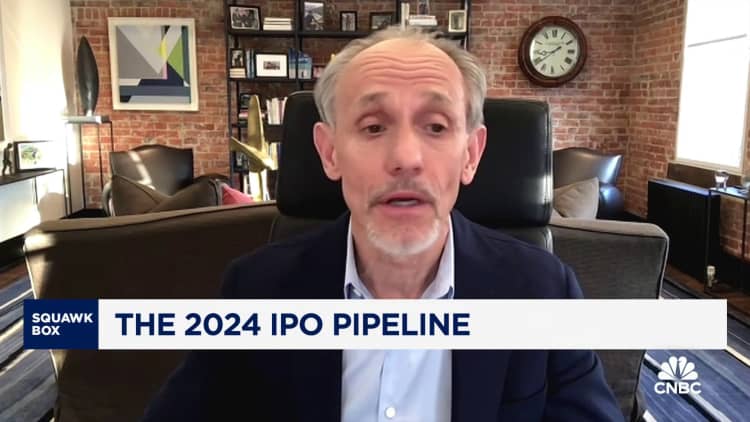
10 Jan Global fintech investment plunges 51% in 2023 but UAE defies slowdown
Europe’s fintech sector is fiercely competitive, with privately-held start-ups worth tens of billions of dollars vying to steal market share from incumbent banks.
Oscar Wong | Moment | Getty Images
The fintech industry saw more pain in 2023, with overall investment falling by half as higher interest rates and worsening macroeconomic conditions caused investors to tighten their belts, according to global investment figures shared exclusively with CNBC.
The data from Innovate Finance, a financial technology industry body, shows that investment in fintechs last year sank $51.2 billion, down 48% from 2022 when total investment in the sector totaled $99 billion. The total number of fintech fundraising deals also sank considerably, to 3,973 in 2023 from 6,397 in 2022 — a 61% drop.
Still, despite that drop, there was one standout performer on Innovate Finance’s list when it came to funding: the United Arab Emirates. According to Innovate Finance, the UAE saw total investment soar 92% in 2023, thanks in part to more fintech-friendly regulations, and as adoption of digital banking and other tools expanded in the region.
That marks the first time the UAE has made it to the top 10 list of most well-funded fintech hubs in 2023, according to Innovate Finance. There were more Asian and Middle East countries in the top 10 last year than there were European nations, the group noted, as some major European economies slipped down the table, such as France and Germany.
“Some of the markets now adopting this technology, we’re seeing that reflected in investment numbers,” Innovate Finance CEO Janine Hirt told CNBC earlier this week. Hirt noted that the momentum in Asia and the Middle East offered an opportunity for the U.K. to boost cooperation and partnerships with countries in those regions. “We are seeing appetite and real momentum coming from a lot of hubs in Asia,” she said.
On the slowdown, Hirt noted that growth-stage companies were the most likely to be affected by the downturn in funding in 2023, whereas seed-stage and early-stage firms were more immune to those pressures.

“If you’re a later-stage company, you might not be going out for a raise right now,” Innovate Finance’s CEO said, adding that early-stage fintechs had a better time in the market last year raising about $4 billion. “That’s a really positive sign,” she added.
“What is a testament to the strength of our sector is that deal sizes are very, very healthy,” Hirt said. “Globally, and in the U.K., investment in seed, Series A and B fintechs has normalized, which is a testament to the strength of investors,” she added.
Financial technology has had its share of gloom over the past 12 months, amid intensifying conflicts between Russia and Ukraine and Israel and Hamas, ongoing geopolitical tensions between the U.S. and China, and broader uncertainties affecting financial markets, such as higher interest rates.
According to the International Monetary Fund, global economic growth is expected to slow to 3% in 2023 from 3.5% in 2022.
UK comes second to U.S.
Innovate Finance also noted that the U.K. was the second-biggest hub for fintech investment in 2023, with total funding for the country’s financial technology industry totaling $5.1 billion in 2023, down 63% from $13.9 billion in 2022.
The U.K. received more investment in fintech than the next 28 European countries combined, according to Innovate Finance.

London fintechs pulled in $4.5 billion last year, with the city continuing to dominate when it comes to fintech funding in Europe more broadly.
However, the U.K.’s capital saw overall funding drop, too — down 56% from 2022.
Meanwhile, female-led fintechs in the U.K. bagged 59 deals year worth a combined $536 million, according to Innovate Finance, accounting for 10.5% of the U.K. total, which the organization called a “step forward” for women founders and leaders.
“I think, ultimately, the U.K. is still very much a global leader in fintech,” Hirt told CNBC. It’s the European leader.”
But, she added, “We can’t afford to rest on our laurels. It’s critical to build on the momentum we’ve had over the past few years. We need government support and regulation that is effective and efficient and proactive.”
“For us, a focus going forward is making sure we do have proper regulation in place that allows fintechs to thrive, and allows SMEs [small to medium-sized enterprises] across the country to benefit from these new innovations as well.”
“Cracking on with new regimes for stablecoins, regimes for crypto, open banking and finance — these are all areas we’re hopeful we’ll see progress in in 2024.”
The United States, unsurprisingly, was the biggest country for fintech investment, with total investment coming in at $24 billion, although funding levels remained down from 2022 as fintech firms raised 44% less in 2023 than they did a year ago.
India came in third after the U.K., with the country seeing fintech investment worth $2.5 billion last year, while Singapore was fourth with $2.2 billion of funding, and China was fifth on $1.8 billion.
The value of the top five biggest deals globally in 2023 was over $9 billion, or about 18% of total global investment in the space.
Stripe pulled in the most amount of cash raising $6.9 billion, according to the data, while Rapyd, Xpansiv, BharatPe, and Ledger won the second, third, fourth, and fifth-biggest investment deals, respectively.
